Unpacking the Truth About Dental Bonding
Many people wonder if does dental bonding damage teeth. The good news is, generally speaking, no, it does not.
Here’s a quick overview:
- Dental bonding is generally safe. It's a common cosmetic procedure.
- It does not weaken your tooth enamel. In fact, it often adds a protective layer.
- The procedure is minimally invasive, often requiring little to no removal of natural tooth structure.
- It's frequently reversible, as the original tooth remains largely intact.
If you've been considering improving your smile, but have held back due to worries about potential harm, you're not alone. We often hear questions about how dental bonding affects your long-term oral health. This article will help clear up those concerns, explaining why this popular cosmetic treatment is a safe and effective way to address various dental imperfections.
At Advanced Smiles Marion, our dentists are committed to providing a five-star dental experience rooted in deep expertise. Our highly educated dentists are leaders in the field, deeply involved in continuing education and dental societies to ensure every patient receives top-tier care. Our team is here to provide clear answers to all your questions, including does dental bonding damage teeth.
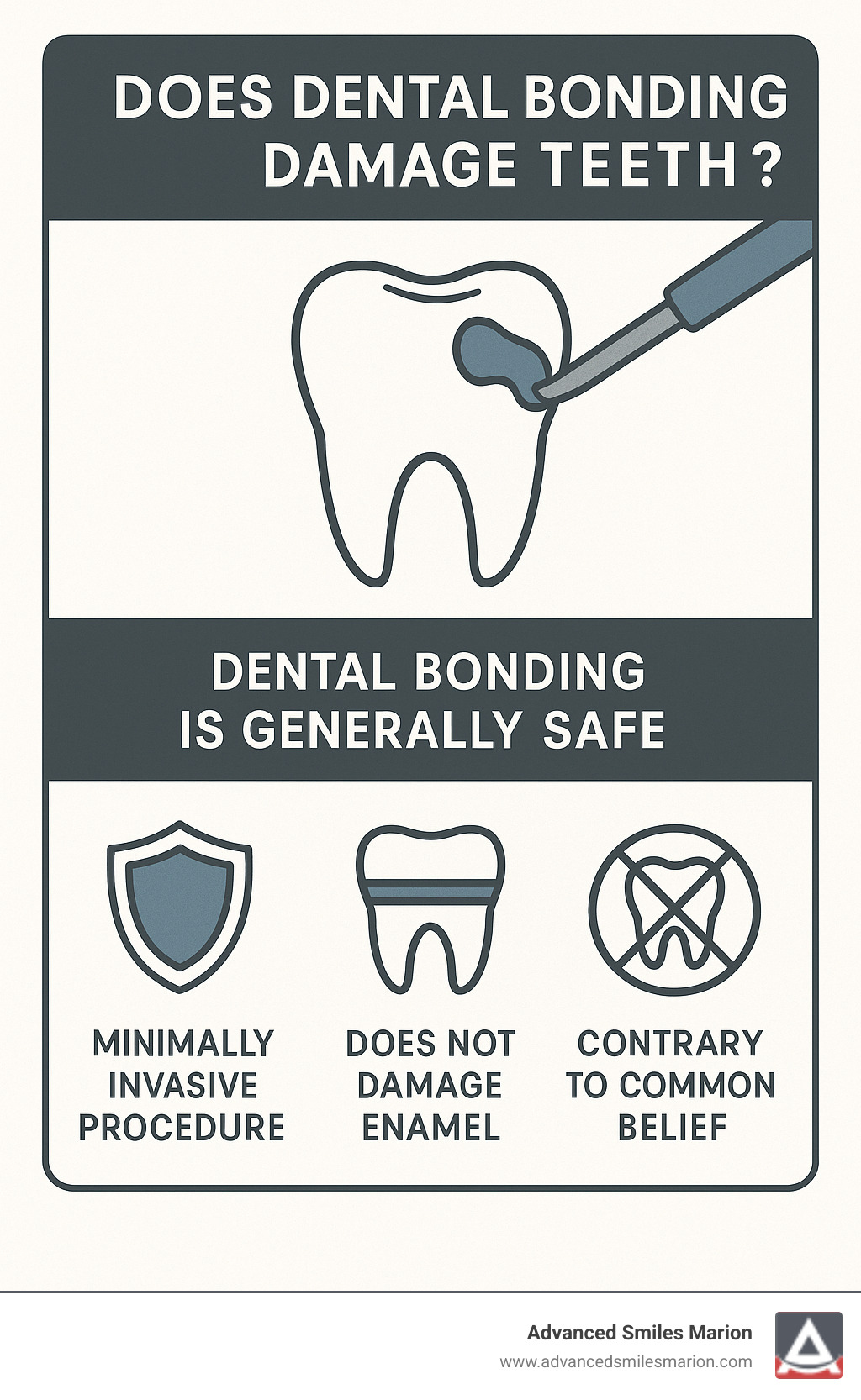
Does dental bonding damage teeth basics:
What is Dental Bonding and How Does It Work?
Dental bonding is a popular and versatile cosmetic dental procedure that can dramatically improve the appearance of your smile, often in a single visit. It's a fantastic solution for a variety of minor dental imperfections, allowing us to restore balance and uniformity to your smile.
So, what exactly is it? At its heart, dental bonding involves applying a tooth-colored composite resin material to the surface of your tooth. This resin is carefully selected to match the existing shade of your natural teeth, ensuring a seamless and aesthetic result. Once applied, our skilled dentists sculpt and mold the resin to the desired shape, effectively correcting cosmetic concerns. A special light, often an ultraviolet light or laser, is then used to harden the resin, creating a strong bond with your tooth. Finally, the bonded tooth is polished to a natural-looking finish.
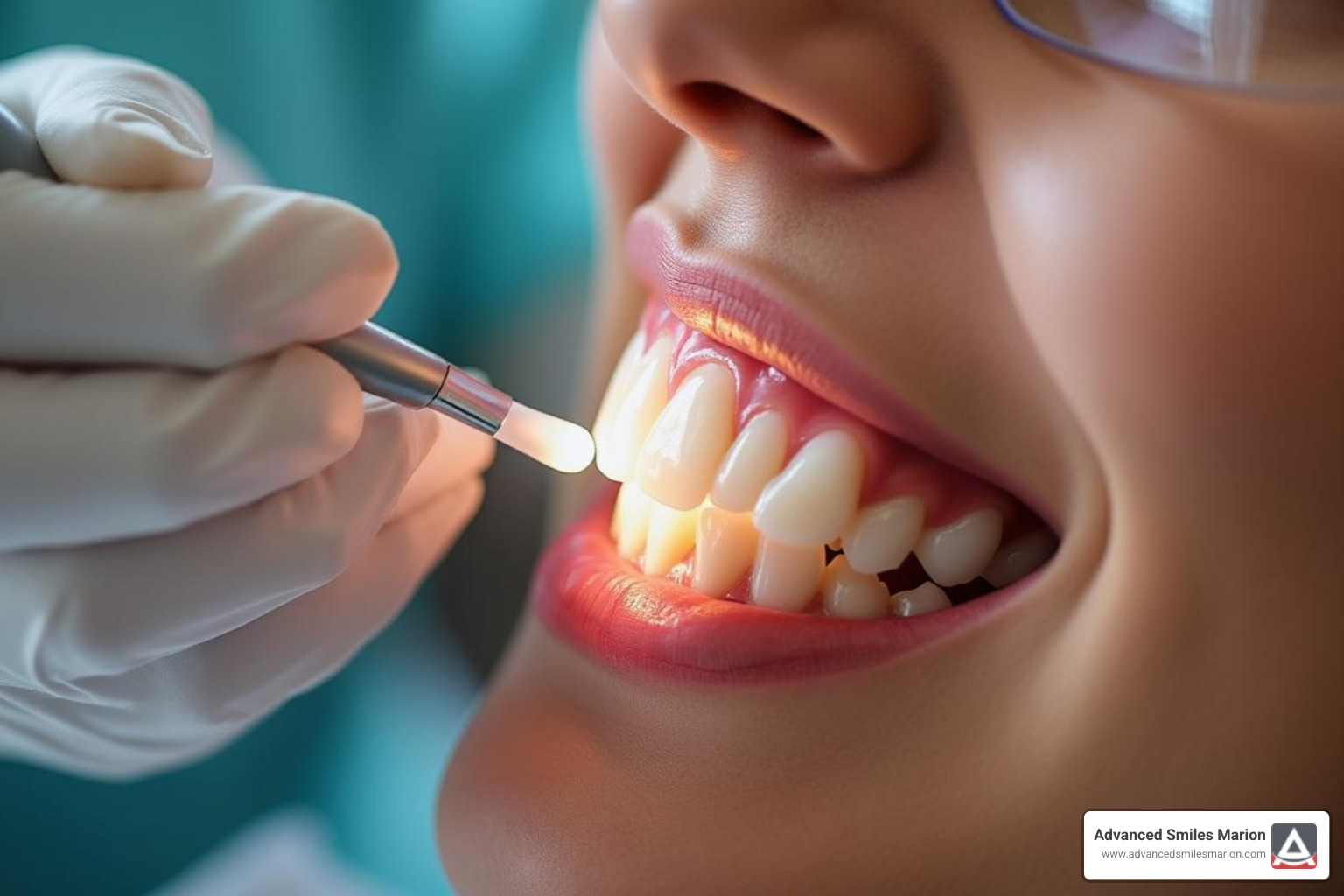
This process is incredibly efficient. The entire procedure can usually be completed in a single visit, often taking as little as 30-60 minutes per tooth. This makes it a convenient option for those looking for quick and effective smile improvements.
We often recommend dental bonding for:
- Fixing chips and cracks: It's an excellent way to repair minor chips or cracks resulting from dental trauma or everyday wear.
- Closing gaps: Small spaces between teeth can be easily closed with bonding, creating a more uniform appearance.
- Covering stains: For discoloration that doesn't respond to teeth whitening, bonding can effectively mask stubborn stains.
- Changing shape or size: We can use bonding to reshape misshapen teeth or make short teeth appear longer, improving overall symmetry.
- Protecting exposed roots: In cases of gum recession, bonding can cover exposed tooth roots, reducing sensitivity and protecting the tooth.
To learn more about the process, you can explore An Essential Guide to Understanding the Teeth Bonding Process.
The Core Question: Does Dental Bonding Damage Teeth?
This is easily one of the most common and important questions we hear from our patients. And it’s a wonderful question to ask! When you're considering any dental treatment, especially one that improves your smile, you want to be sure it's safe and won't harm your natural teeth in the long run.
So, let’s get right to it: does dental bonding damage teeth? The simple and reassuring answer is no, it generally does not. In fact, dental bonding is celebrated for being one of the most conservative and minimally invasive cosmetic dental procedures available today. It's designed to work with your existing tooth structure, not against it.
Unlike some other treatments that might require significant changes to your natural tooth, bonding works by adding a protective layer of material to your tooth. The preparation is incredibly gentle, often involving just a slight roughening of the tooth surface and applying a special liquid. This helps the composite resin stick firmly. This preparation is very minimal and does not remove or damage your healthy enamel.
At Advanced Smiles Marion, our dentists are dedicated to preserving your natural tooth structure. Our entire team is highly trained and experienced in applying dental bonding with great care and precision. This ensures your original tooth stays largely intact. Even respected organizations like the Cleveland Clinic note that dental bonding is a safe and effective treatment. You can find more information in A note from Cleveland Clinic. It's important to clear up any myths that suggest bonding harms teeth; it’s actually designed to improve and protect your smile, not cause damage. This careful approach also means the treatment can be reversible in many cases, which we’ll dive into next.
Does dental bonding weaken tooth enamel?
Another common worry we hear is whether dental bonding will weaken your tooth enamel. We can confidently tell you that this is simply not the case! In reality, dental bonding is designed to strengthen and protect your tooth, rather than making it weaker.
Here’s why you can feel good about it:
- No enamel removal: For most bonding procedures, there's no need to remove any of your natural enamel or "grind" your teeth down. This is a big difference compared to some other cosmetic options, where a small amount of enamel might be removed. Bonding is an additive procedure, meaning we're adding material to your tooth, not taking away from it.
- Surface roughening vs. grinding: When we talk about "roughening" the tooth surface, it's a super tiny, microscopic etching process. This creates little pores for the bonding material to seep into, forming a really strong connection. This is miles away from grinding away significant parts of your tooth.
- Added tooth strength: The composite resin material, once bonded, actually creates a protective layer over your tooth. This can help shield your underlying enamel from daily wear and tear. It can even help reduce the risk of decay in the bonded area. Think of it as a helpful shield for your smile!
- Protecting existing enamel: For teeth that have minor chips or cracks, bonding acts as a helpful barrier, preventing any further damage to your natural enamel. It's like putting a tiny, invisible cast on a minor injury.
Our main goal at Advanced Smiles Marion is always to improve your smile while keeping your natural teeth healthy and strong. Dental bonding is a fantastic example of a minimally invasive technique that delivers beautiful results without compromise. You can explore more about how this cosmetic bonding helps create captivating smiles in Dental Artistry: 4 Ways Cosmetic Bonding Helps to Create Captivating Smiles.
Can dental bonding be removed?
Yes, absolutely! This is one of the key benefits of dental bonding and a huge reason why it’s considered such a tooth-friendly and conservative option. Because the procedure involves adding composite resin to your existing tooth structure, rather than removing a lot of your natural enamel, your original tooth remains largely intact underneath the bonding.
The reversibility of bonding means you have extra peace of mind. If you ever decide you want to change your smile, or if the bonding material simply needs to be replaced after many years, it can often be removed without damaging your natural tooth surface. While the composite resin is firmly bonded, a skilled dentist can carefully remove it, often in just one visit. This process can restore your tooth to its original state underneath. So, choosing to improve your smile with bonding isn't a permanent, irreversible alteration to your natural teeth, which is a great feeling!
Potential Risks and Long-Term Considerations
While dental bonding is a truly wonderful and safe treatment, it's also important to understand how to keep your new smile looking its best for years to come. Like anything good in life, a little care goes a long way! Dental bonding is designed to be durable, but it's not quite as strong as your natural tooth enamel or the porcelain used in veneers or crowns. This means there are a few things to keep in mind.
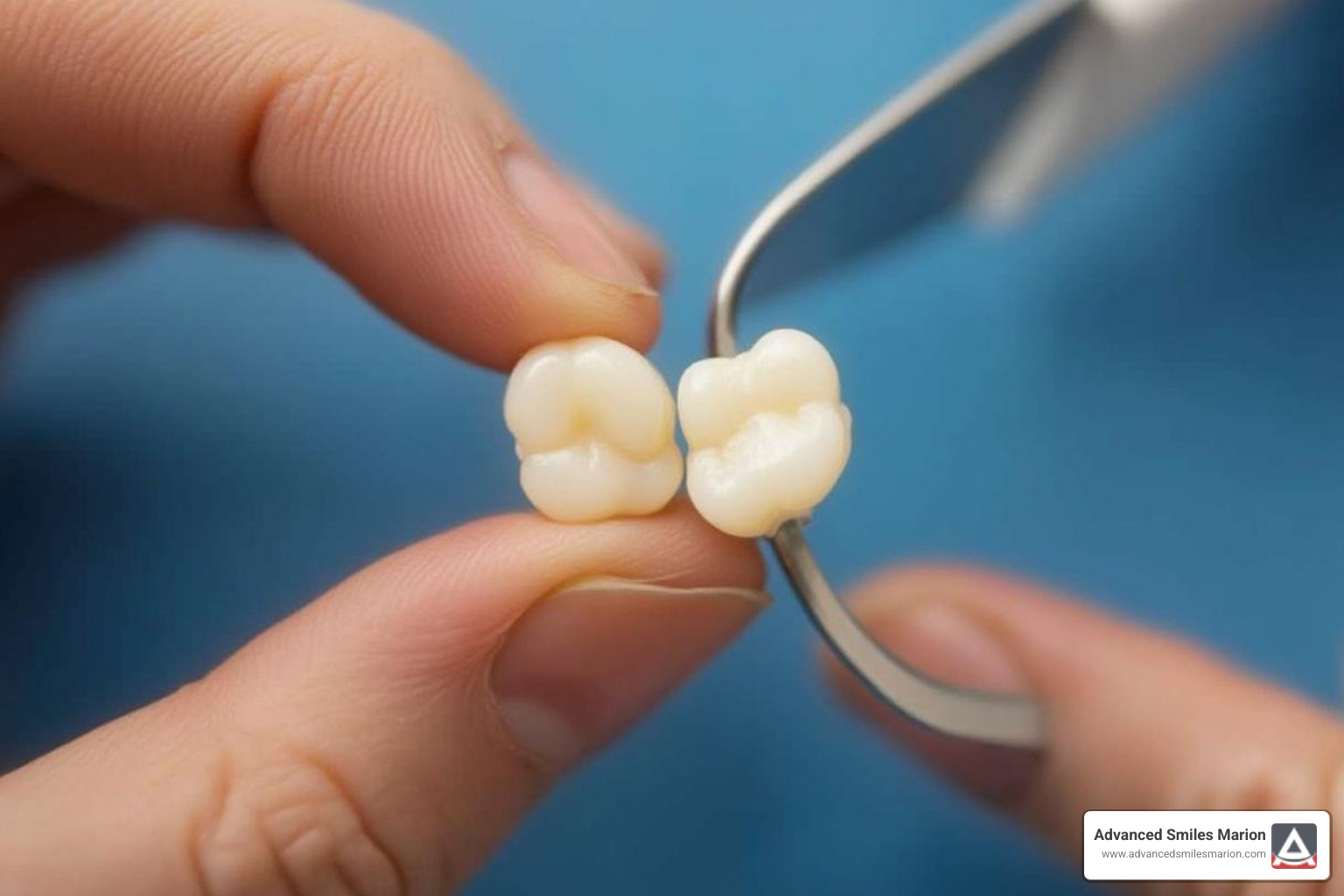
First, let's talk about durability and longevity. While your beautiful new bond can last anywhere from 3 to 10 years (with 5 to 7 years being a common average), it's not a permanent solution. Its lifespan really depends on how well you care for it. The composite resin used in bonding can be susceptible to chipping, especially if you're a fan of super hard foods like ice, hard candies, or nuts. Even habits like chewing on pens or biting your nails can put your bonded teeth at risk. But don't worry, with a little mindfulness, you can easily minimize these risks!
Another important point is staining potential. The composite resin material is a bit more porous than your natural tooth enamel. This means it can absorb colors from highly pigmented foods and drinks more easily. Think coffee, tea, red wine, berries, and those delicious tomato-based sauces. Smoking can also contribute to discoloration. Over time, you might notice your bonded areas looking a little duller or darker than your natural teeth. The good news is that regular maintenance and being aware of what you eat and drink can help keep your bonded smile bright.
Can dental bonding cause tooth sensitivity?
Sometimes, after a dental bonding procedure, you might experience a little tooth sensitivity. Think of it like your tooth getting used to its new outfit! This is usually mild and should disappear within a few days. It might happen if the tooth was already a bit sensitive beforehand, or if the bonding material is placed very close to the gumline.
It's a very normal part of the adjustment process. However, if that sensitivity hangs around for too long, becomes really uncomfortable, or if you notice any gum irritation that doesn't go away quickly, please don't hesitate to give us a call at Advanced Smiles Marion. Our dentists and team are always here to make sure you're comfortable and your smile is healthy!
Can bonded teeth be whitened?
This is a really excellent question, and it's super important to understand! The simple answer is generally no, not in the same way your natural teeth get whiter. The special composite resin material we use for dental bonding just doesn't react to teeth whitening treatments like hydrogen peroxide.
What does this mean for you? If you decide to whiten your natural teeth after you've had dental bonding, your natural teeth will get lighter, but the bonded areas won't change color. This could leave you with a noticeable color difference, where your bonded teeth appear darker.
That's why we always recommend that if you're thinking about professional teeth whitening, you should do it before you get dental bonding. This way, we can get your natural teeth to your desired shade first. Once your smile is as bright as you want it, we can then pick a composite resin shade that perfectly matches your newly whitened teeth. This ensures a seamless, beautiful, and naturally harmonious smile that you'll absolutely love! To learn more about getting that dazzling smile, check out Want a Dazzling Smile That Exudes Confidence? Find Teeth Bonding at Advanced Smiles Marion.
How Bonding Compares to Veneers and Crowns
When you're dreaming of enhancing your smile, you'll often hear about a few key options: dental bonding, porcelain veneers, and dental crowns. Each of these solutions has its own special place in cosmetic dentistry. They all work wonders, but they're suited for different situations, depending on what you're hoping to achieve, how extensive the changes are, and your personal preferences.
To help you understand the differences at a glance, here’s a quick comparison:
| Feature | Dental Bonding | Porcelain Veneers | Dental Crowns |
|---|---|---|---|
| Invasiveness | Minimally invasive; little to no enamel removal. | Moderately invasive; requires some enamel removal. | Most invasive; significant tooth reduction required. |
| Durability | Moderate; composite resin can chip/stain. | High; porcelain is very strong and stain-resistant. | Very High; covers entire tooth, very strong. |
| Longevity | 3-10 years (typically 5-7 years). | 10-15 years or more. | 15 years to a lifetime. |
| Cost | Most affordable (least expensive option). | Moderate to high. | High. |
| Procedure Time | Single visit (30-60 min per tooth). | Typically 2 visits. | Typically 2 visits. |
| Aesthetics | Natural-looking, but can stain over time. | Highly aesthetic, mimics natural translucency. | Excellent aesthetics, especially porcelain crowns. |
| Reversibility | Often reversible. | Irreversible (due to enamel removal). | Irreversible (due to tooth reduction). |
As you can see from the table, dental bonding really shines when it comes to cost-effectiveness and speed. It's often the most affordable cosmetic option, making it a fantastic choice for many people looking for a positive change without breaking the bank. Plus, the fact that you can usually get your new smile in just a single visit is a huge convenience for our busy patients here in Marion, OH! Its minimally invasive nature and reversibility also make it a very appealing choice, especially for minor cosmetic improvements.
Now, if you're looking for a solution that handles more significant cosmetic issues, or you desire a longer-lasting, highly stain-resistant result, porcelain veneers might be on your radar. Veneers are custom-made shells that cover the front surface of your teeth. They offer superior stain resistance and can truly transform your smile with their highly natural aesthetic, often lasting 10 to 15 years or even longer with good care. While they are a bit more involved than bonding, requiring some enamel preparation, the results can be stunning.
Then there are dental crowns. These are often the choice for teeth with extensive damage, decay, or those needing maximum durability. A crown essentially caps the entire tooth, providing incredible strength and protection. While they are the most invasive option, requiring more tooth reduction, they can last for 15 years to a lifetime, making them a very robust solution for long-term dental health and beauty.
It's also worth noting that while these options focus on improving your existing teeth, dental implants are a wonderful solution for missing teeth. They serve a different purpose entirely, providing a stable, natural-looking replacement for a lost tooth.
At Advanced Smiles Marion, we believe in providing truly personalized solutions. Our experienced dentists are here to help you understand which treatment best fits your specific needs, your unique smile goals, and your lifestyle. We'll walk you through all the options, ensuring you feel confident and informed every step of the way. For a closer look at the financial aspects, you can explore Cost Dental Bonding vs Veneers.
Maintaining Your Bonded Teeth for a Lasting Smile
Once you've achieved that radiant, confident smile with dental bonding, the journey doesn't stop there! Just like any valuable investment, your bonded teeth thrive with a little tender loving care. Think of it as nurturing your natural teeth, with just a few special considerations to keep that sparkle lasting for years to come.
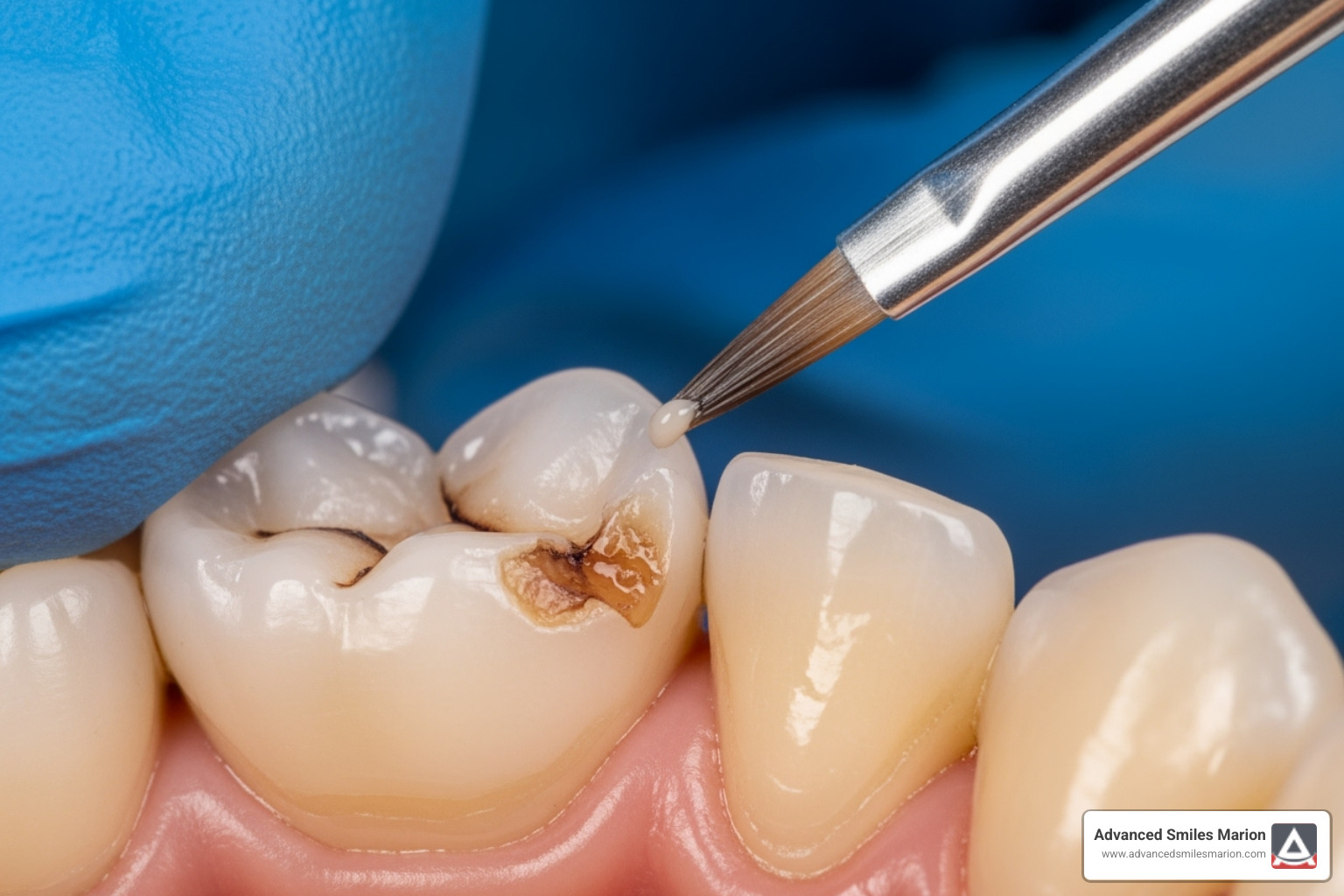
The foundation of a lasting smile, whether bonded or natural, begins with excellent oral hygiene. That means brushing gently at least twice a day with a non-abrasive toothpaste and flossing daily. This simple routine is your best friend in preventing plaque buildup and those pesky stains. For our patients without dental insurance, our Dental Wellness plan provides an affordable way for individuals and families to receive the yearly care they need at a discounted price. It even includes two fluoride treatments a year, which can give your overall oral health an extra boost and offer added protection for your beautiful bonded teeth.
Next, let's talk about habits. While dental bonding is quite durable, the composite resin isn't quite as strong as your natural tooth enamel. So, it's wise to avoid biting hard objects. Think of ice, hard candies, nuts, or using your teeth to open packages as "no-go" zones. Training yourself to use your back molars for tougher foods can also make a big difference in protecting your bonded areas from chips or cracks.
Another important tip is to limit staining foods and drinks. Because the bonding material is a bit more porous than natural enamel, it can be more prone to picking up stains over time. Try to cut back on coffee, tea, red wine, colas, and dark berries. If you do enjoy them, a quick rinse with water afterward, or even using a straw for beverages, can help minimize direct contact with your bonded teeth.
For those who tend to grind or clench their teeth, especially at night (a habit known as bruxism), this can put extra stress on your bonded teeth. This pressure might lead to chipping or premature wear. If this sounds like you, we might recommend a custom-fitted night guard. It's a simple, comfortable solution that acts as a protective cushion for your smile while you sleep.
Finally, regular dental check-ups are absolutely crucial. Consistent visits to our caring team at Advanced Smiles Marion allow us to monitor the condition of your bonding, perform thorough professional cleanings, and catch any minor issues before they become bigger concerns. We can also gently polish your bonded teeth to help maintain their lovely shine. By following these straightforward guidelines, you'll significantly extend the life and beauty of your dental bonding.
What are the benefits of choosing dental bonding?
We've already cleared up the big question: does dental bonding damage teeth? The answer is a resounding no, and that's just the beginning of its appeal! There are so many wonderful reasons why our patients choose dental bonding to achieve the smile they've always dreamed of.
For starters, it's incredibly affordable. Dental bonding stands out as one of the most budget-friendly cosmetic dental procedures available today. It offers a truly remarkable aesthetic improvement without the higher financial commitment often required for options like veneers or crowns. This makes it a fantastic starting point for many looking to improve their smile.
Then there's the incredible speed of treatment. As we discussed, bonding can often be completed in just one visit. Imagine walking into our office and walking out a short while later with a beautifully transformed smile – it's like a "smile makeover in a day," and it's incredibly appealing, especially for those with busy schedules.
Dental bonding is also wonderfully versatile for cosmetic issues. It's a superhero when it comes to addressing a wide array of minor imperfections. From fixing pesky chips and cracks to gently closing small gaps, covering stubborn discoloration, or even subtly reshaping teeth, it's a go-to solution for many common cosmetic concerns.
And here's some truly comforting news: it's typically a painless procedure. In most cases, dental bonding doesn't even require anesthesia. This means you can often relax comfortably while our skilled dentists work their magic. Patients often describe the experience as surprisingly straightforward and easy.
Lastly, and this is a huge benefit, it's a minimally invasive treatment. Unlike some other procedures that involve removing healthy tooth structure, bonding works by adding to your tooth. We preserve the majority of your natural tooth, which perfectly aligns with our philosophy of conservative dentistry here at Advanced Smiles Marion.
At Advanced Smiles Marion, we truly believe that everyone deserves a smile they feel confident sharing with the world. Dental bonding offers an affordable, quick, and highly effective path to achieving just that. For an even deeper dive into the power of this treatment, explore Transform Your Smile: The Affordable Power of Teeth Bonding.
Conclusion: A Safe and Effective Path to a Confident Smile
We understand that making decisions about your dental health can feel overwhelming, especially when you're concerned about potential risks. But when it comes to the question does dental bonding damage teeth, we hope this article has put your mind at ease with clear, evidence-based answers.
Let's recap the key points: dental bonding is safe, minimally invasive, and does not damage your natural teeth. Rather than harming your enamel, it actually adds a protective layer that can strengthen and shield your existing tooth structure. The procedure preserves your natural tooth, making it often reversible – a huge advantage over more invasive treatments.
While bonding does have some considerations like potential staining and the need for eventual replacement, these are easily manageable with proper care and regular dental visits. The benefits – affordability, speed, versatility, and being painless – make it an excellent choice for addressing various cosmetic concerns.
The success of your dental bonding experience depends greatly on choosing a skilled and experienced dental team. At Advanced Smiles Marion, our dentists bring extensive education and expertise to every procedure. We're committed to providing personalized cosmetic solutions that not only improve your smile but also prioritize your long-term oral health.
Our practice goes beyond traditional dentistry, offering innovative treatments like laser therapy for TMJ pain, canker sore healing, and periodontal disease treatment. Whether you need Invisalign, teeth whitening, veneers, crowns, root canals, digital dentures, or emergency dental care (which we often provide same-day), we're equipped to handle all your dental needs under one roof.
We believe everyone deserves a smile they're proud of, and dental bonding offers an accessible path to achieving that goal. Your comfort, confidence, and oral health are our top priorities, and we're here to guide you through every step of your smile change journey.
Ready to find how dental bonding can improve your smile? Learn more about our Dental Bonding services and take the first step toward the confident smile you've always wanted.

Panel 1: Marion's Origins
This opening scene pays homage to Marion's unspoiled beginnings. Earthy colors beautifully depict a cardinal, curious and forward-looking, amidst dense woods – a nod to the land before human touch.
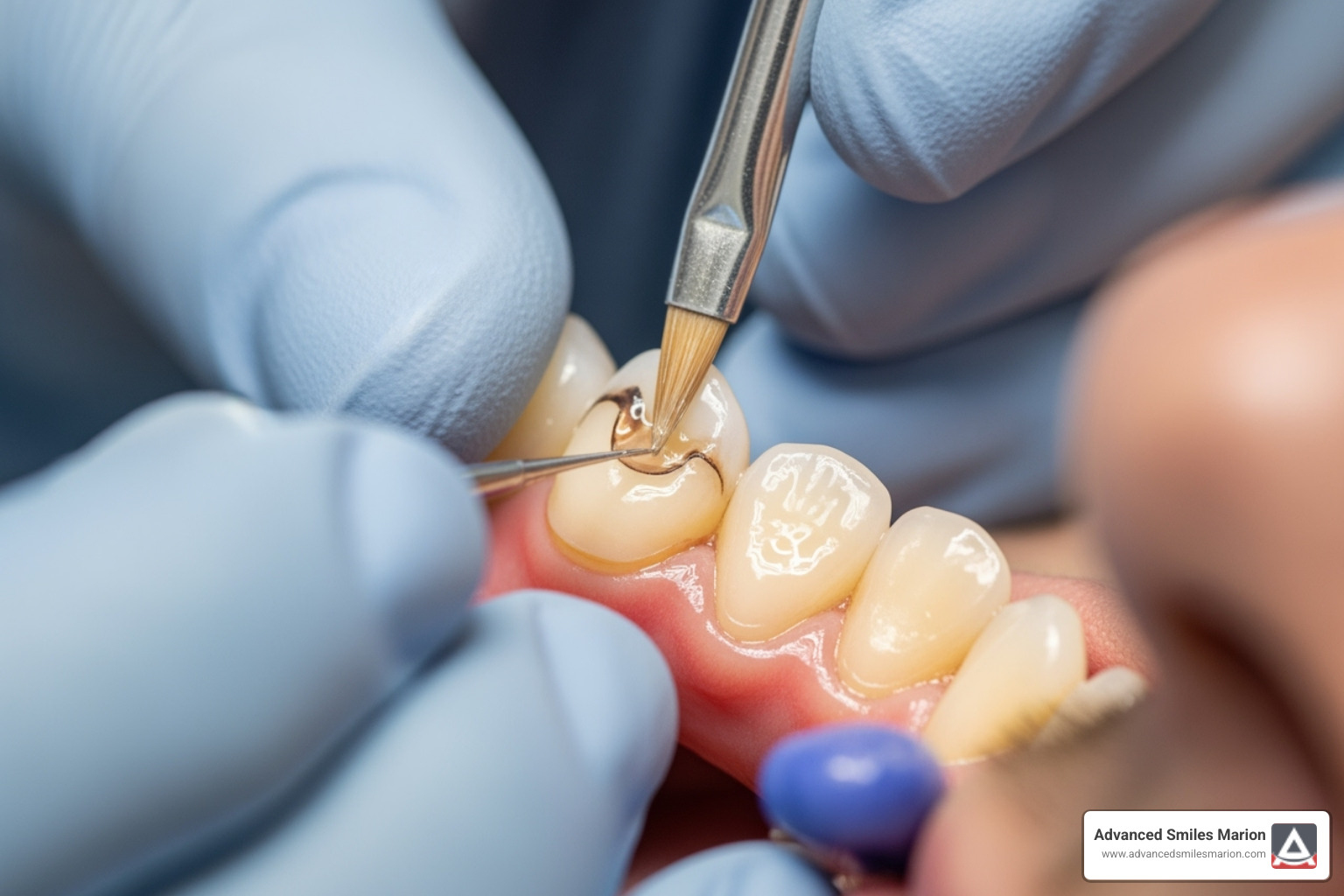
Get in touch
Have any questions? Want to learn more?

